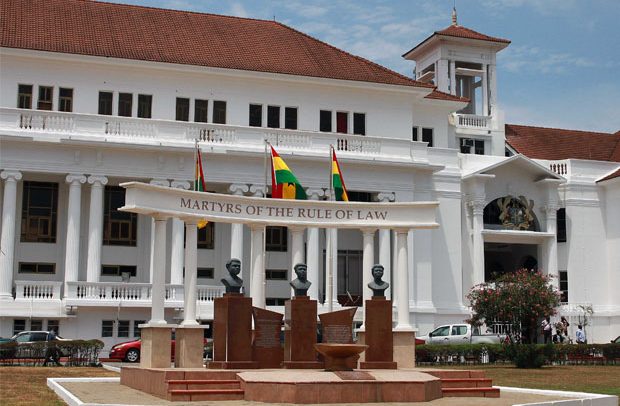The Supreme Court yesterday, in a unanimous decision, validated the decision by 138 New Patriotic Party (NPP) Members of Parliament to vote and approve the 2022 Budget and Economic Policy of Government.
This was after the Apex Court gave its interpretation on Articles 102 and 104 Clause 1 of the 1992 Constitution, on whether a Deputy Speaker could vote while presiding in the absence of the Speaker of Parliament.
The 138 NPP MPs including the first Deputy Speaker of Parliament, Joseph Osei-Owusu on November 30, 2021, voted to approve the budget in the absence of the Minority National Democratic Congress (NDC) MPs, who had boycotted the proceeding.
The approval thereby reversed the decision by the Minority NDC, which had earlier voted and rejected the budget in a proceeding that was also boycotted by the NPP MPs.
Both the rejection of the budget by the NDC and the approval by the NPP generated various interpretations of the constitutional provisions by various scholars.
A private legal practitioner and a law lecturer at the University of Professional Studies (UPSA), Justice Abdulai, subsequently went to the Apex Court seeking an interpretation of the law on the matter.
He was seeking a declaration that, upon a true and proper interpretation of Articles 102 and 104(1) of the 1992 Constitution, a Speaker or any other person presiding over Parliament cannot be said to be part of the members present for the purposes of decision making.
That position was opposed by the Attorney General, Godfred Yeboah Dame, who argued that a Deputy Speaker of Parliament or any member presiding over proceedings in the House in the absence of the Speaker, is entitled to be counted for the purpose of making up the quorum of half of the Members of Parliament (MPs) required by Article 104 (1) of the Constitution for the determination of matters in Parliament.
Judgment
A seven-member panel of the court presided over by Justice Jones Dotse and assisted by Justices Nene Amegatcher, Prof. Nii Ashie Kotey, Mariama Owusu, Avril Lovelace Johnson, Clemence J. Honyenuga, and Yoni Kulendi, in a unanimous decision, validated the approval of the budget by the 138 majority members which included the first Deputy Speaker of Parliament, who presided over the proceedings.
“Upon a true and proper interpretation of Article 102 and 104(1) of the Constitution, a Deputy Speaker or any Member of Parliament presiding over Parliament in the absence of the Speaker can vote and take part in the decision by Parliament. That is to say that a Deputy Speaker or a person presiding other than the Speaker does not lose their right to vote when they are presiding over the proceedings of Parliament,” the court held.
The court, as a result struck out Oder 109(3) of the Standing Orders of Parliament which states that, “A Deputy Speaker or any other member presiding shall not retain his original vote while presiding,” as unconstitutional, inconsistent and in contravention of Article 102 and 104(1) of the Constitution.
The court, therefore, concluded that “the decision taken on the 30th day of November, 2021, by Parliament of Ghana to approve the 2022 Budget was valid as 138 members including the presiding member voted when the decision was made.”
BY Gibril Abdul Razak


